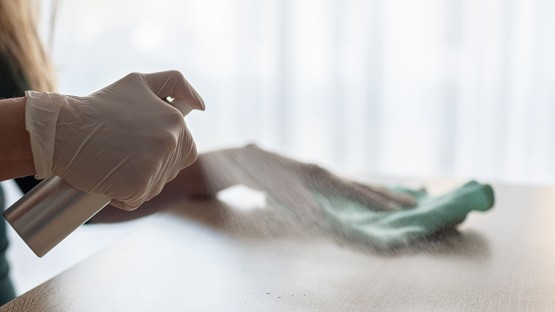The commercialization of a Cornell-created antimicrobial coating technology that keeps surfaces clean by extending the life of chlorine-based disinfectants – by days and even weeks – is being fast-tracked to determine how well it can combat COVID-19.
Its potential to prevent COVID-19 from contaminating private and public spaces has attracted the interest of the National Science Foundation, which on May 21 awarded the company $256,000 from its COVID-19 Rapid Response Research (RAPID) program to expedite the product’s development. The company received a separate $225,000 RAPID grant from the NSF on May 12 to fight hospital-based infections related to COVID-19.
The technology grew out of collaboration between Minglin Ma, associate professor of biological and environmental engineering in the College of Agriculture and Life Sciences, and former postdoctoral researcher Mingyu Qiao. Qiao joined Ma’s lab in 2017 to work on a USDA-funded project developing high-performance antimicrobial materials for agriculture and food safety.
Ma and Qiao realized their coating technology – a thin-film polymer that can be sprayed on surfaces to safely prolong the life of disinfectants – had public health applications as well. Last year, they partnered with Ted Eveleth, MBA ’90, to launch Halomine Inc., with support from the Praxis Center for Venture Development and the Cornell Center for Materials Research.
Halomine’s flagship product, HaloFilm, was created before the coronavirus pandemic began, but Qiao said the company realized the product could have another important application.
“Originally, we were targeting bacteria for agricultural use, but the problem of bacteria is the same in the hospital,” said Qiao, Halomine’s chief technology officer. “Then this pandemic happened, so we quickly responded to the virus outbreak. When you’re an academic, your technology may only have one stated purpose, but if it’s a very good technology, you suddenly find it has a broad application and can address some immediate crisis.”
HaloFilm, licensed through Cornell’s Center for Technology Licensing, can be applied to a wide range of surfaces and materials, including plastic, metal and even fabric. It functions as a binding agent, with one adhesive molecule clinging to the surface it’s applied to, and a different molecule (N-halamine) forming a rechargeable covalent bond with chlorine.
Once the HaloFilm is sprayed on a surface, any chlorinated cleaner or off-the-shelf sanitizer can be applied atop it. Without HaloFilm, these disinfectants would only last for about an hour before evaporating, thus allowing pathogens to take root and spread. But HaloFilm locks in the chlorine and aims to keep high-touch surfaces free of bacteria and viruses for up to a week before the disinfectant or sanitizer needs to be reapplied. Low-traffic areas should remain protected for up to a month.
“Essentially you’re turning the surface into a chlorine battery,” Eveleth said. “When pathogens come along, the chlorine will leave the surface, go to the pathogen and kill it. Over time, that will deplete the level of chlorine. Then you can recharge that surface with another application of a chlorinated product.”
The company is also producing test strips that can be rubbed on a surface to detect the presence of chlorine, so users know when the HaloFilm needs to be recharged.
“A lot of technology is very fancy, very cool, but very expensive,” said Qiao, Halomine’s chief technology officer. “When Minglin and I first designed this, we really considered its feasibility. Chlorine is very cheap, so we can scale it up quickly. It’s much cheaper for the commercialization process because your risk is lower than some other nanotechnology that’s not feasible.”
While high concentrations of chlorine can be harmful, HaloFilm, with its 200 nanometer-thick polymers, can be safely used in any environment, including kitchens and restaurants, as well as homes, hospitals, schools and businesses.
The company – which took first place in a startup competition organized by Entrepreneurship at Cornell last November, was a 2019 Grow-NY finalist and participated in Upstate New York I-Corps – has partnered with the Kevin M. McGovern Family Center for Venture Development in the Life Sciences to conduct additional biological research and testing against coronaviruses.
The company plans to make HaloFilm available to pre-order for U.S. consumers through a Kickstarter campaign that will launch soon.
“As faculty, especially working in applied engineering and materials, I think the most promising thing is to see the technology from your lab be commercialized and have real impact on the society,” Ma said. “Mingyu really brought in this expertise and combined it with our existent experience in biomaterials. We are lucky to have this team, especially with Ted on the business side, to help push the company to the next level in such a short time, with the resources we have. We are starting from a very small model and building up.”
















